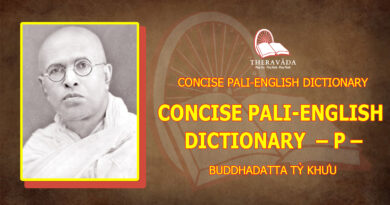BUDDHISM IN THE EYES OF INTELLECTUALS – BUDDHISM AND OTHER RELIGIONS
BUDDHISM IN THE EYES OF INTELLECTUALS – BUDDHISM AND OTHER RELIGIONS
Post Buddhistic Hinduism
The various ways in which Buddhism influenced, modified, transformed, and revitalised Hindu religion among all the philospohical Sutras of the Hindus, are admitted post Buddhistic. The presuppostion of Indian philosophy in the doctrine of Karma and rebirth and other pre Buddhistic system have attained fullest development from Buddhistic literature and been established on philosphical basis.
– Dr. S. N. Das Gupta
Universal Ethics
None the preBuddhistic religions of India may be said to have been able to formulate a code of ethics and religion that wass unversally and compulsorily valid for all.
– Dr. S. N. Das Gupta
Buddhism is Buddhism
Buddhism and Jainisn were certainly not Hinuism ot even the Vedic Dharma. Yet they arose in India and were integral parts of Indian life, culture and philosophy. Buddhist or Jaina in India is a hundred per cent product of Indian thought culture, yet neither is Hindu by faith. It is entirely misleading to refer to Indian culture as Hindu culture.
– Nehru, “Discovery of India”
Eternal Debt to the Buddha
It is my deliberate opinion that the essential part of the teachings of the Buddha now forms an integral part of Hinduism. IT is impossible for Hindu India today to retrace her steps and go behind the great reformations that Gautama effected in Hinduism. By his immense sacrfice, by his great renuniation, and by the immaculate purity of his life he left an indelible impress upon Hinduism, and Hinduism owes an eternal debt of gratitude to the great teacher.
– Mahatma Gandhi, “Maha Bodhi”
Dominant creed
A system which knows no God in the Western sense, which denied a soul to man, which counts the belief in immorality a blunder, which refuses any effecacy to prayer and sacrifice, which bides man to look to nothing but their own efforts for salvation, which in its orginal purity knew nothing of vows of obedience and never sought the aid of the secular arm, yet spread over a considerable motley of the old world with marvellous rapidity and is still, which whatever base admixture of forcing supertitions, the dominant creed of a large fraction of mankind.
– T.H. Huxley
Buddhist Idea of sin
Its idea of sin differs somewhat from the Christian idea. Sin to the Buddhist is mere ignorance or stupidity. The wicked man is an ignorant man. He doesn’t need much punishment and condemnation so much as he needs instruction. He is not regarded as ‘violating God’s commands’ or as one who mest beg for divine mercy and forgiveness. Rather it is necessary fo rthe sinner’s friends to make him reason in the human way. The Buddhist does not believe the sinner can escape the consequences in prayerful attempts to bargain with God.
– John Walters, “Mind Unshaken”
Gods need salvation
For the first time in human history the Buddha admonished, entreated and appealed to people not to hurt a living being, not to offer prayer of praise or sacrifice to gods. With all the eloquence as his command the exalted one vehemently proclaimed that gods are slso in direction need of salvation of themselves.
– Prof. Rhys Davids









